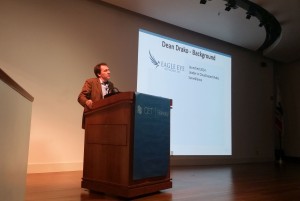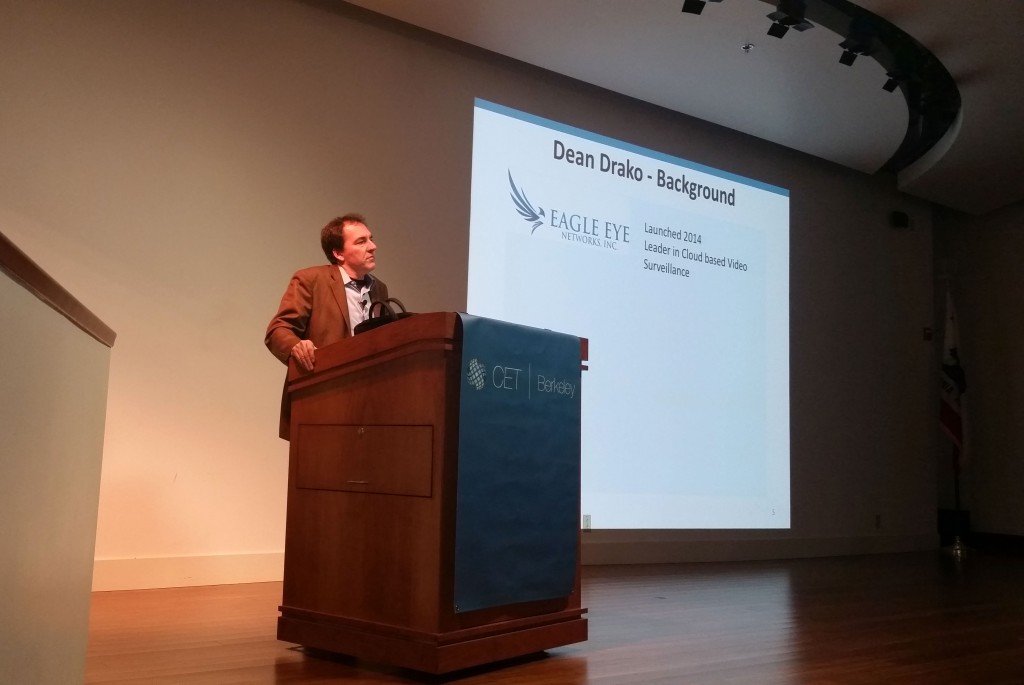“How many of you are interested in starting a company?” Dean Drako asked the audience filling the auditorium. From diverse programs, countries and cultures, most of the students raised their hands, and the lecture started.
This was the beginning of the Newton Lecture Series, where Drako, who is currently cofounder, president and CEO of Eagle Eye Networks, Inc.—talked about his experience in the business world and shared valuable advice with the students.
After getting his masters from UC Berkeley, Drako spent 25 years in Silicon Valley. One of his biggest successes has been Barracuda Networks, a public company that offers security and storage products based on network appliances and cloud services. He left Barracuda to found Eagle Eye Networks, a company focusing on cloud-based video surveillance.
Drako, who has founded more than five successful companies, reminded the students and soon-to-be entrepreneurs that only one in ten companies are typically successful, and pointed out the importance of both strategy and execution.
He shared his personal guidelines to leading a successful entrepreneurial venture: find and solve a problem from your own experience (as a consumer or business person); make money and conserve cash; make customers very happy—his favorite part of being an entrepreneur; measure the results and adapt quickly; and build for success, not for an exit.
He also talked about the cloud and the big opportunity it represents, along with the transformation that comes with the “API Economy,” a huge change in how software is developed around the world.
The entrepreneur also encouraged students to develop their communication skills, both writing and speaking, and highlighted the differences between building connections and relationships. “Connections are not particularly useful, in my opinion,” said Drako, adding that strong relationships are the ones that “keep business moving.”
He talked about the different ingredients of success, “One third really hard work, one third being smart, and one third being lucky.” And he insisted: “Change creates opportunity.”
“How many of you are interested in starting a company?” Dean Drako asked the audience filling the auditorium. From diverse programs, countries and cultures, most of the students raised their hands, and the lecture started.
This was the beginning of the Newton Lecture Series, where Drako, who is currently cofounder, president and CEO of Eagle Eye Networks, Inc.—talked about his experience in the business world and shared valuable advice with the students.
After getting his masters from UC Berkeley, Drako spent 25 years in Silicon Valley. One of his biggest successes has been Barracuda Networks, a public company that offers security and storage products based on network appliances and cloud services. He left Barracuda to found Eagle Eye Networks, a company focusing on cloud-based video surveillance.
Drako, who has founded more than five successful companies, reminded the students and soon-to-be entrepreneurs that only one in ten companies are typically successful, and pointed out the importance of both strategy and execution.
He shared his personal guidelines to leading a successful entrepreneurial venture: find and solve a problem from your own experience (as a consumer or business person); make money and conserve cash; make customers very happy—his favorite part of being an entrepreneur; measure the results and adapt quickly; and build for success, not for an exit.
He also talked about the cloud and the big opportunity it represents, along with the transformation that comes with the “API Economy,” a huge change in how software is developed around the world.
The entrepreneur also encouraged students to develop their communication skills, both writing and speaking, and highlighted the differences between building connections and relationships. “Connections are not particularly useful, in my opinion,” said Drako, adding that strong relationships are the ones that “keep business moving.”
He talked about the different ingredients of success, “One third really hard work, one third being smart, and one third being lucky.” And he insisted: “Change creates opportunity.”



